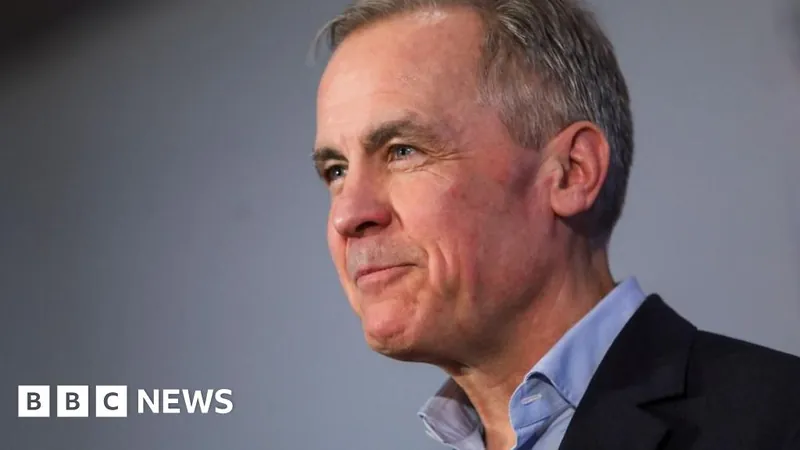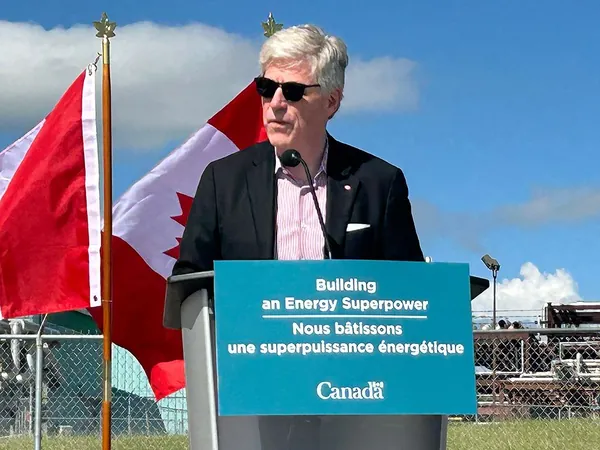
Mark Carney: The 'Unreliable Boyfriend' of Central Banking Seek Leadership in Canada
2025-01-17
Author: Michael
Former Bank of England Governor Mark Carney is now back in Canada, vying for the leadership of the Liberal Party. But what lessons does his intriguing tenure in London hold for Canadian voters?
Mark Carney made history in 2013 as the first non-British individual to head the Bank of England in its 300-year history. Prior to his London appointment, he served as Governor of the Bank of Canada starting in 2008, right before the onset of the Great Financial Crisis, where he made a name for himself by successfully navigating the treacherous waters of economic turmoil.
With deep-rooted connections to the UK—having studied at Oxford University and married to an English woman—his transition to London felt almost like a homecoming. His tenure at the Bank of England saw significant reforms and a modernization of operations. Notably, he took on the additional responsibility for financial regulation when the Financial Services Authority was dissolved, marking a pivotal moment in UK financial oversight.
Carney wasn't just a faceless bureaucrat; he actively communicated with the public and the media more than any of his predecessors. In a landmark decision in 2015, he reduced the frequency of interest rate meetings from twelve to eight annually and initiated the practice of publishing detailed minutes following interest rate decisions, enhancing transparency in the Bank's operations.
Upon taking charge, Carney found interest rates at historic lows and launched a controversial "forward guidance" policy, aimed at stimulating the economy by promising not to raise rates until unemployment dipped below 7%. This approach quickly earned him the nickname of the "unreliable boyfriend" from a Member of Parliament, a term that would haunt him through various financial decisions.
His proactive stance wasn't limited to just monetary policy. Ahead of significant constitutional referendums, Carney made bold predictions about economic stability. In 2014, he warned Scotland that it may have to relinquish financial authority if it sought independence while continuing to use the pound. Just before the Brexit referendum, he cautioned that leaving the EU could lead the UK into a recession, highlighting the critical nature of his role as a financial stabilizer.
After the Brexit vote and the resignation of Prime Minister David Cameron, Carney faced one of his biggest challenges. He reassured a shaken nation that the financial system was robust, a day he would later describe as his "toughest." Subsequently, the Bank of England slashed interest rates from 0.5% to 0.25% and revived its quantitative easing program to the rescue of the economy.
As the Covid-19 pandemic struck in March 2020, Carney once again took decisive action, cutting interest rates swiftly and attempting to stabilize the economy amidst unprecedented chaos. Many admired his belief that the economic downturn was merely temporary.
Carney’s global experience also includes a significant stint as Chair of the Financial Stability Board from 2011 to 2018, where he worked closely with international regulatory authorities during the tumultuous Trump years. His regular participation in G20 meetings provided him with a unique insight into global economic dynamics, adding to his expertise as he navigates political waters in Canada.
Moreover, Carney has emerged as a strong advocate for climate change initiatives. His role as a UN Special Envoy for Climate Change and his establishment of the Glasgow Financial Alliance for Net Zero underscores his commitment to using financial mechanisms to combat environmental threats.
As Mark Carney steps into the spotlight in Canada, voters wonder whether his storied past in banking will translate into successful leadership. Can he truly transform the Liberal Party and address pressing issues, or will he remain the 'unreliable boyfriend' of politics?









 Brasil (PT)
Brasil (PT)
 Canada (EN)
Canada (EN)
 Chile (ES)
Chile (ES)
 Česko (CS)
Česko (CS)
 대한민국 (KO)
대한민국 (KO)
 España (ES)
España (ES)
 France (FR)
France (FR)
 Hong Kong (EN)
Hong Kong (EN)
 Italia (IT)
Italia (IT)
 日本 (JA)
日本 (JA)
 Magyarország (HU)
Magyarország (HU)
 Norge (NO)
Norge (NO)
 Polska (PL)
Polska (PL)
 Schweiz (DE)
Schweiz (DE)
 Singapore (EN)
Singapore (EN)
 Sverige (SV)
Sverige (SV)
 Suomi (FI)
Suomi (FI)
 Türkiye (TR)
Türkiye (TR)
 الإمارات العربية المتحدة (AR)
الإمارات العربية المتحدة (AR)